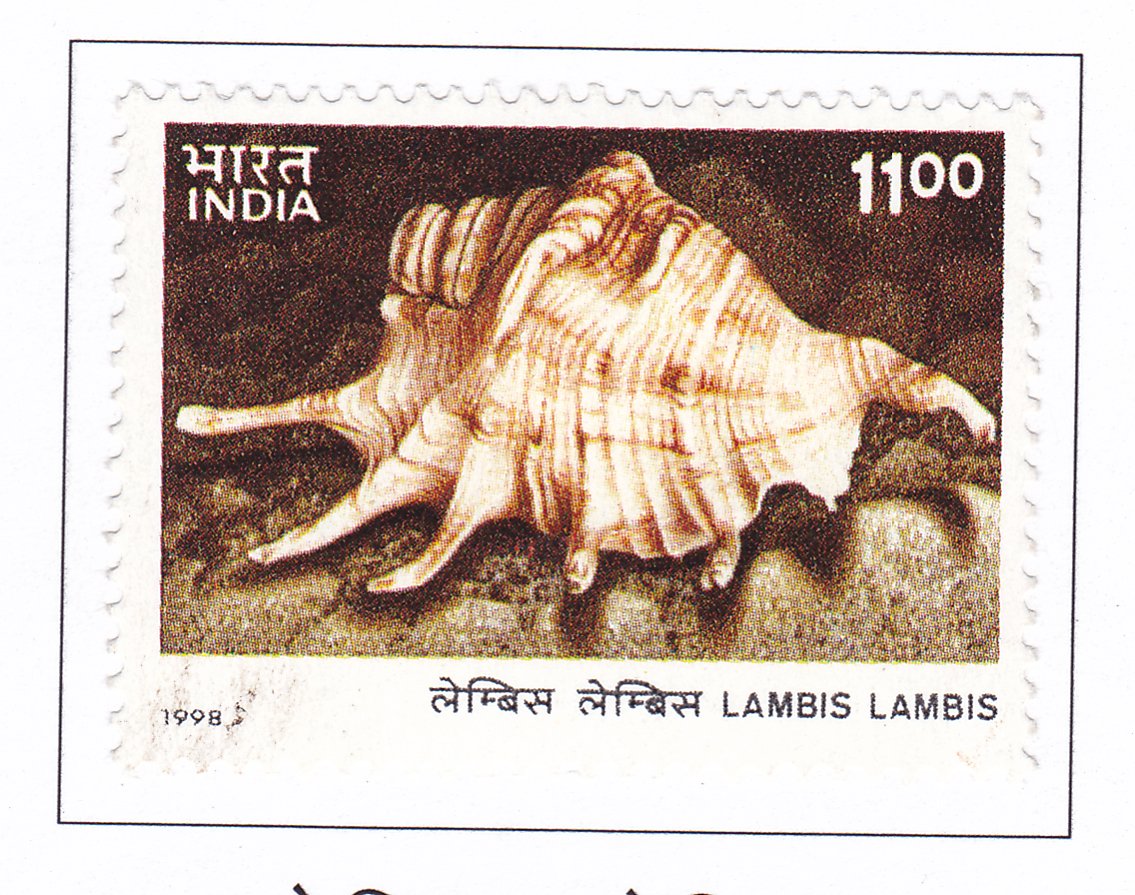Spider Conch (Lambis lambis)

Technical Data
| Stamp Set | Shells from the Andaman and Nicobar Islands |
|---|---|
| Date of Issue | December 30, 1998 |
| Denomination | Rs. 11 |
| Quantity | 1,000,000 |
| Perforation | comb 13½ x 13 |
| Printer | Security Printing Press, Nashik |
| Watermark | No Watermark |
| Colors | Multicolor |
| Catalog Codes |
Michel IN 1670 Stamp Number IN 1731 Yvert et Tellier IN 1435 Stanley Gibbons IN 1833 |
| Themes | Animals (Fauna) | Molluscs | Sea Life | Shells | Snails and Slugs |
Table of Contents
The Spider Conch (Lambis lambis) is a striking sea shell known for its unique and intricate appearance. Here’s a detailed overview of this mollusc:
Spider Conch (Lambis lambis)
Description:
- Appearance: The Spider Conch is recognized by its large, elaborately spined shell, which resembles the legs of a spider. The shell is typically white to cream in color with brownish or reddish bands and a glossy finish.
- Size: It can grow up to around 200 mm (8 inches) in length, making it one of the larger species of conchs.
- Texture: The shell features long, curved spines extending from its whorls, giving it a distinctly ornate and “spidery” appearance.
Habitat:
- Distribution: The Spider Conch is found in the Indo-Pacific region, particularly around coral reefs and sandy or muddy substrates from the Red Sea to the Western Pacific Ocean.
- Environment: It prefers shallow, tropical waters, often inhabiting sandy bottoms near coral reefs where it can burrow and seek shelter.
Ecological Significance:
- Role in Ecosystem: The Spider Conch is a predatory mollusc that feeds on various marine invertebrates such as worms, small crustaceans, and other molluscs. It plays a role in controlling the populations of its prey.
- Adaptations: The long, spiny projections on its shell serve as a defense mechanism against predators, providing a deterrent due to its intimidating appearance.
Cultural and Symbolic Value:
- Value: The Spider Conch is highly valued among collectors and in the shell trade due to its dramatic and eye-catching appearance. Its distinctive shape and size make it a prized specimen.
- Symbolism: In some cultures, conch shells, including the Spider Conch, are used in traditional ceremonies, decorations, and as symbols of prosperity and natural beauty.
Stamp Design:
- Visual Representation: The stamp design for the Spider Conch would showcase its elaborate, spiny shell structure, highlighting its unique features such as the extended spines and intricate coloration.
- Background Elements: The design might include elements that reflect its natural habitat, such as coral reefs or sandy seafloors, to give context to the shell’s environment.
Educational Impact:
- Awareness Raising: Featuring the Spider Conch on a stamp can draw attention to the beauty and diversity of marine life and the importance of preserving marine ecosystems.
- Conservation Message: By highlighting the Spider Conch, the stamp can also contribute to broader efforts to promote marine conservation and awareness of oceanic biodiversity.
The Spider Conch stamp celebrates the remarkable and diverse world of marine molluscs, emphasizing the need for conservation and appreciation of marine life.
